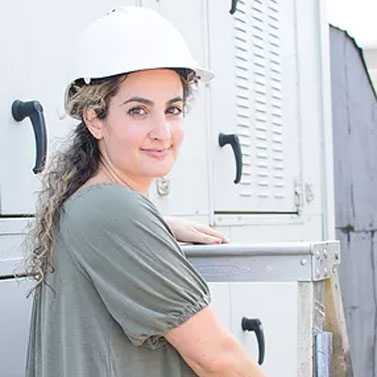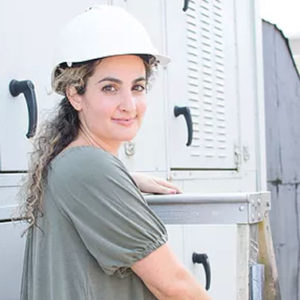
05 Apr 9 Experts with Honest Ways to Decide if Solar Power Makes Financial Sense
Everyone knows the benefits of solar, but does it make financial sense? Whose answer can you trust? We asked the experts and here are 9 candid responses on how to decide if solar power makes financial sense.

Scott W Johnson
Scott W Johnson is the owner of WholeVsTermLifeInsurance.com
There are many hidden ways to look at buying solar panels and its far far more complicated that most consumers can understand. I purchased solar panels on my old house two years ago and I also deal with them as an insurance agent.
So – how do you determine if it makes sense?
- Go to your power provider and pull down a years worth of bills. Separate out your gas and your electrical. Get a sense for method used to determine the increasing price of power. Note this is super complex but some power companies charge more for the time of day and other more as you go past certain metrics
- Get two competitive quotes for the panels
- Ask if there is any other work that “needs to be done” such as upgrading your electrical or replacing your roof.
- Of special note here – if you already were planning on getting a roof or already planning on upgrading some electrical – it can be useful to do it at the same time as you put panels on.
- Find out State Local and Federal Rebates and/or Tax Credits available
- Now is the time to do the math on a spreadsheet and see if the numbers make sense. Do not trust the sales presentations of the people quoting you on the panels.
Keep in mind that you want to see both how long it takes to recoup your money and what the rate of return is.
For the Rate of the Return there are several versions:
- Regular Rate of Return
- Rate of Return with Fed/State Tax Credits
- Rate of Return with Fed/State Tax Credits and Taking into consideration that of tax free income status. In other words the money you are saving from not spending on the local power company is a tax free investment return – not unlike a muni bond. If you need to take out a loan to finance this becomes super messy, generally I would try and avoid this.
- Now a Fourth Version and Very Controversial Rate of Return can also be considered: Rate of Return with Fed/State Tax Credits and Taking into consideration that of tax free income status and adding in the “required additional work.” I can best explain this with an example. You already need a new roof, but the panels require that say 35% of your roof needs to be replaced to put panels on them. You can “sometimes” add 35% of the roof cost to the federal tax credit program and hence this massively increases your ROI.
You can do all this, or just find a knowledgeable neighbor that looked into it all and ask them what the numbers show.
Stephanie Bell
Stephanie Bell Consulting: Over 20 years of utility regulatory experience.
Matthias Alleckna
Matthias Alleckna, an energy industry analyst at EnergyRates.ca, a leading energy rate comparison website. We provide users with unbiased third-party reviews of electricity and natural gas retailers so they can choose the best options for them.
As the green energy market grows faster and faster, we get to learn more about solar energy and erase some myths surrounding the topic. People worry a lot about solar panels and winter, the idea of running out of energy because of the cold, cloudy season. However, researchers from recognized institutions such as the Michigan Technological University and the Northern Alberta Institute of Technology have found out that winter can even boost your solar energy production, because of the white colors reflecting sunlight.
When it comes to financial gains and solar panels, a lot of myths are being debunked too. Nowadays is still quite expensive to install a solar energy system at home, but such prices are going down, especially due to rising rebate rates. As governments notice the benefits of solar energy, we can see many rebates options being boosted by official organizations. Some programs can help you pay for 50 percent of your initial costs with solar energy systems, depending on where you live. Such initiatives will automatically reduce the time period you would need to wait to see your solar-powered system pay off.
Also, it’s always important to remember we are talking about a long-term investment, so the decision will make more sense as the years go by and you start to see your money coming back. A solar-powered system can run for decades, around 25 to 30 years, a lifespan longer than the average money-back time for such devices. In the US, for example, the average payback time is between 6 and 8 years, which means you would still have around 20 years to enjoy low-cost energy.
Steve Slocum
Owner/CEO of Base Price Power. We employ a team of Solar Consultants in Southern California. We help families create positive change and take advantage of renewable energy! Yes, it really is that exciting!
There are many options for homeowners to convert their homes to solar, many for $0 down. Our job as Solar Consultants is to discuss these options and help families make an educated decision.
Some of these options include maintenance and monitoring, some don’t. Some are eligible for the Federal Tax Credit, some are not. Which program fits this family best?
We also evaluate the home to see if it is fit for solar.
- Does the roof get enough sunlight?
- Does the home need to upgrade the main electrical panel?
- Are we putting the panels on the front, back, or the side of the house?
- Is there a flock of radioactive pigeons living in the attic?
- Things your average Solar Consultant wouldn’t have the experience to look for.

Jordana Viuker Brennan
Founder & Senior Consultant at Confident Buildings, Inc.
Assuming you are in the United States… Look at your roof on google earth.
- Does it face south?
- If not, is it facing southeast or southwest?
- Is it obstructed by trees, other buildings, pipes, or chimneys (i.e. is it often shaded)? To find this out, look at your roof throughout the day yourself (if possible).
- If it is shaded, are you able and/or willing to cut down trees or branches to ensure it’s a lot less shaded?
Plenty of (if not all) solar PV companies will provide free financial analyses, including tax credits/deductions, utility or government incentives, and a payback period. Analyze that thoughtfully or hire someone like me to do so. Look into the assumptions they are making – electricity rate currently, projected electricity rate, depreciation, impacts of producing more than you’re using (i.e. net metering), etc.
Personally, I think any payback period that is less than (or even equal to) the life of the system makes sense if you want to do the right thing – i.e. reduce your contribution to climate change, etc. Everyone varies in their level of comfort, but a payback period of 5-10 years means that after that, you will be cost positive. They are incentivized to sell more systems and more panels, so be on the lookout for whether each panel makes sense. Look at the layout the company proposes: are they taking into consideration all of the potential shading that will occur at all parts of the year?
Evaluate the proposals you get from PV contractors for all of the aforementioned, but also get a sense of the company – who you will be working with, how communicative and trustworthy do they seem (speak to prior customers), what do the panels look like, what’s the maintenance policy if any, do they come out to remove snow from the roof (unlikely – so that’s on you if you want your system to be running!), who’s the manufacturer / will they be around if you need replacement parts, etc.
Solar PV makes a ton of sense when done properly, though one should definitely also look at improving the efficiency of their home first or in addition. There are likely many other, lower cost items that have shorter payback periods that may not be as “sexy” as solar, but are great for the pocketbook.

William Seavey
My background is in developing a small back-up solar electric system primarily for outages. See powerfromsun.com. I have sold thousands of DIY manuals and can take some credit for educating people on “basic” solar starting over 15 years ago.
Solar makes sense only if you can quantify your electric bill, say, over a period of five years and compare that with the cost of an install (or lease). A factor is also whether you plan to stay in your home indefinitely–but if you do decide to sell, presuming you have an already paid for system on your rooftop, whether the system’s value will add significant value to the sale.
While solar panels have come down greatly in cost (as little as $1 a watt or less), the costs of an installation on the rooftop and grid-tie connecftion to existing electrical infrastructure are significant. Consumer Reports has said this is the best way to go, but on the other hand a lease arrangement doesn’t require an upfront cost, and were you to sell the equipment would be taken off your roof (unless the new owner agreed to the lease).
Although I personally own about 15 180 watt panels bought nearly five years ago, our modest $100-$125 electric bill has made an install a bit hard to justify. But recently we bought a Toyota Prius Prime which is a plug-in hybrid and the electric bill has gone up somewhat. So that may tip the scales to a solar install soon, to counteract the car charging cost.

Sherren Harter
Sherren Harter has worked in the renewable energy industry since 2011 and is currently the Director of Marketing at Freedom Solar Power, a Texas-based solar company. Her previous roles include marketing and brand management at Green Mountain Energy Company, consumer packaged food manufacturers such as Kraft Foods, and consulting. She lives in Austin, Texas.
Assuming that your home, business, or property is a good fit for solar based on sun exposure and shading, the next most important question is whether it is a good financial investment.
In most cases, that has very little to do with the total price of the solar power system and more to do with price of electricity and financing options.
A solar array is an income-generating asset, just like a rental property. The higher the price of electricity in your area, the more money it will produce for you (through net metering policies). That means a higher return on your investment and a faster payback.
Even in areas where electricity prices are relatively low, such as in Texas, a solar system can be financed at a monthly payment amount that is roughly equal to your average electricity bill. The investment, which is cash-flow-neutral from day one, becomes cash-flow-positive as energy prices increase over time due to inflation, and solar produces a phenomenal return when the loan is paid off. With a 25-year warranty on most panels and higher resale value if you sell your home before then, investing in solar is a no-brainer.
With all of that said, the availability of federal, state and local incentives definitely improve the financial profile of solar. It is important to understand what rebates are available locally and to be aware of the step-down in the federal investment tax credit (ITC) after 2019.
Nancy Schimmel
Nancy Schimmel has been writing and recording songs for children about the environment since 1990. The title song from her CD Sun, Sun Shine: Songs for Curious Children is about solar power.

Keith Hevenor
As Communication Manager for Nexamp, Keith Hevenor helps to spread the word about the importance of a clean energy future and how community solar makes the power of the sun available to everyone, from homeowners and renters to small businesses and non-profits.
Who are solar panels NOT a wise investment for?In the right situation, solar panels can be a great investment for a homeowner. Costs for panels have continued to fall, and generous tax incentives live on, making the ROI quite appealing for some. But what if you have too much shade on your roof? What if your home faces the wrong direction? What if your roof will need repair or replacement in the next few years? What if you rent your home or live in an apartment? Studies show that as many as 50% of homes are not suitable for rooftop solar, so for these individuals, solar panels are clearly not a wise investment. But that doesn’t mean that solar is out of reach. Many consumers are finding the answer in community solar farms, sites that feature larger solar arrays capable of providing power for hundreds of homes at a time. By enrolling in a project, subscribers get a share of the energy credits generated by the farm, helping to reduce their monthly costs by about 10 percent while supporting the growth of clean energy.
Community solar is really taking off today for a number of reasons, not the least of which is its easy availability with no required investment or long-term commitment. Energy costs are rising, climate change is expected to have a significant impact on the environment and economy in the next 20 years, and many experts see solar as an important part of the solution. Solar power is already helping many states meet their ambitious clean energy goals, with community solar expected to be one of the fastest growing segments of solar.
Community solar is already available in some form in more than 42 states; favorable policy and legislation is driving robust growth in nearly half of those states. The clean power generated by community solar farms has more than doubled in the past year and continues to grow. Community solar provides a wide range of benefits—subscribers save money on their electric bills, landowners earn guaranteed income through long-term leases, and the utility grid gains a clean source of power.
Rooftop solar panels can be a good investment for some, but for many that just isn’t the case. Consumers need to consider their financial resources for upfront investment, the viability of their roof and whether they will remain in that home long enough to achieve the ROI. For those who determine that rooftop solar is not a wise investment, community solar, if available, may be the right choice. The Solar Energy Industries Association has a helpful guide that explains how it works.



